TED英语演讲:如何在说话时表现出你的专业性
- 格式:docx
- 大小:27.82 KB
- 文档页数:20
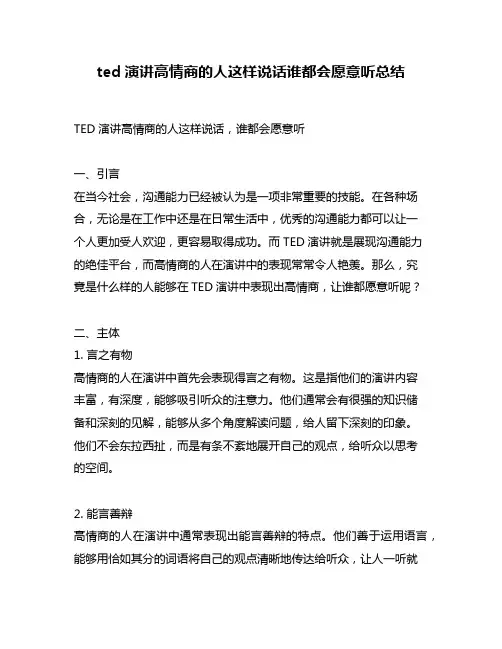
ted演讲高情商的人这样说话谁都会愿意听总结TED演讲高情商的人这样说话,谁都会愿意听一、引言在当今社会,沟通能力已经被认为是一项非常重要的技能。
在各种场合,无论是在工作中还是在日常生活中,优秀的沟通能力都可以让一个人更加受人欢迎,更容易取得成功。
而TED演讲就是展现沟通能力的绝佳平台,而高情商的人在演讲中的表现常常令人艳羡。
那么,究竟是什么样的人能够在TED演讲中表现出高情商,让谁都愿意听呢?二、主体1. 言之有物高情商的人在演讲中首先会表现得言之有物。
这是指他们的演讲内容丰富,有深度,能够吸引听众的注意力。
他们通常会有很强的知识储备和深刻的见解,能够从多个角度解读问题,给人留下深刻的印象。
他们不会东拉西扯,而是有条不紊地展开自己的观点,给听众以思考的空间。
2. 能言善辩高情商的人在演讲中通常表现出能言善辩的特点。
他们善于运用语言,能够用恰如其分的词语将自己的观点清晰地传达给听众,让人一听就懂。
在表达自己的观点时,他们也善于运用一些修辞手法,如比喻、排比等,使得演讲更加生动有趣。
这样的表达方式往往能够引起听众的共鸣,让他们更愿意倾听。
3. 善于倾听除了表达自己的观点外,高情商的人在演讲中还会表现出善于倾听的品质。
他们会留意听众的反应,根据听众的反馈来调整自己的表达方式,让演讲更加贴近听众的需求。
他们还会给听众留下提问的时间,积极回应听众的问题,与听众建立真诚的沟通,这样的互动能够增强听众的参与感,让他们更愿意长时间地倾听。
4. 总结回顾在演讲的结尾部分,高情商的人通常会对自己的观点进行总结回顾。
他们会简洁地概括自己的观点,给听众留下深刻的印象,同时也让听众更容易记住自己的观点。
通过总结回顾,他们能够让听众更全面、深刻地理解演讲内容,增强感染力,让听众更加认可自己的观点。
三、个人观点和理解高情商的人在TED演讲中能够表现得深入浅出,言之有物,善于倾听,并且运用恰如其分的语言将自己的观点传达给听众,从而让谁都愿意倾听。
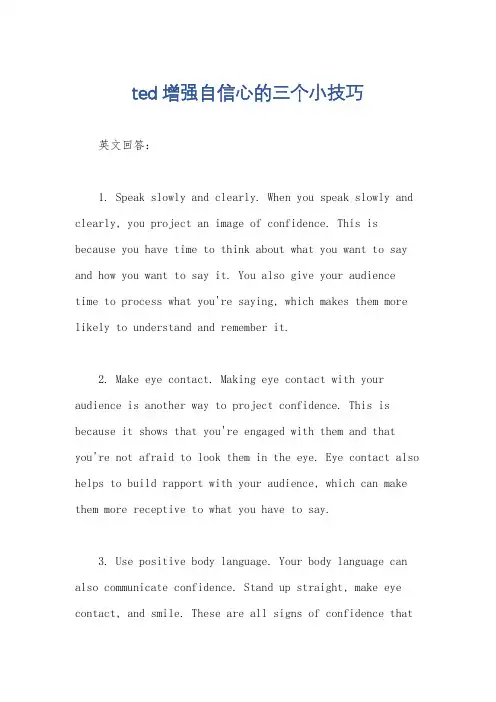
ted增强自信心的三个小技巧英文回答:1. Speak slowly and clearly. When you speak slowly and clearly, you project an image of confidence. This is because you have time to think about what you want to say and how you want to say it. You also give your audience time to process what you're saying, which makes them more likely to understand and remember it.2. Make eye contact. Making eye contact with your audience is another way to project confidence. This is because it shows that you're engaged with them and thatyou're not afraid to look them in the eye. Eye contact also helps to build rapport with your audience, which can make them more receptive to what you have to say.3. Use positive body language. Your body language can also communicate confidence. Stand up straight, make eye contact, and smile. These are all signs of confidence thatwill make you appear more confident to others.中文回答:1. 慢速清楚地说话。
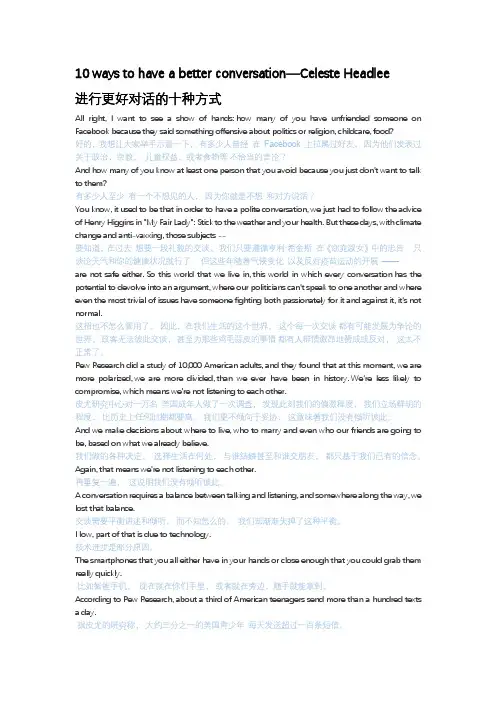
10 ways to have a better conversation—Celeste Headlee进行更好对话的十种方式All right, I want to see a show of hands: how many of you have unfriended someone on Facebook because they said something offensive about politics or religion, childcare, food?好的,我想让大家举手示意一下,有多少人曾经在Facebook 上拉黑过好友,因为他们发表过关于政治,宗教,儿童权益,或者食物等不恰当的言论?And how many of you know at least one person that you avoid because you just don't want to talk to them?有多少人至少有一个不想见的人,因为你就是不想和对方说话?You know, it used to be that in order to have a polite conversation, we just had to follow the advice of Henry Higgins in "My Fair Lady": Stick to the weather and your health. But these days, with climate change and anti-vaxxing, those subjects --要知道,在过去想要一段礼貌的交谈,我们只要遵循亨利·希金斯在《窈窕淑女》中的忠告:只谈论天气和你的健康状况就行了。
但这些年随着气候变化以及反对疫苗运动的开展——are not safe either. So this world that we live in, this world in which every conversation has the potential to devolve into an argument, where our politicians can't speak to one another and where even the most trivial of issues have someone fighting both passionately for it and against it, it's not normal.这招也不怎么管用了。
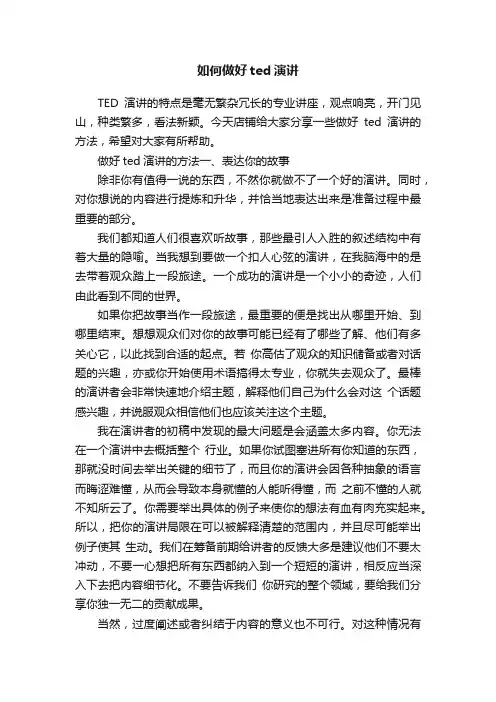
如何做好ted演讲TED演讲的特点是毫无繁杂冗长的专业讲座,观点响亮,开门见山,种类繁多,看法新颖。
今天店铺给大家分享一些做好ted演讲的方法,希望对大家有所帮助。
做好ted演讲的方法一、表达你的故事除非你有值得一说的东西,不然你就做不了一个好的演讲。
同时,对你想说的内容进行提炼和升华,并恰当地表达出来是准备过程中最重要的部分。
我们都知道人们很喜欢听故事,那些最引人入胜的叙述结构中有着大量的隐喻。
当我想到要做一个扣人心弦的演讲,在我脑海中的是去带着观众踏上一段旅途。
一个成功的演讲是一个小小的奇迹,人们由此看到不同的世界。
如果你把故事当作一段旅途,最重要的便是找出从哪里开始、到哪里结束。
想想观众们对你的故事可能已经有了哪些了解、他们有多关心它,以此找到合适的起点。
若你高估了观众的知识储备或者对话题的兴趣,亦或你开始使用术语搞得太专业,你就失去观众了。
最棒的演讲者会非常快速地介绍主题,解释他们自己为什么会对这个话题感兴趣,并说服观众相信他们也应该关注这个主题。
我在演讲者的初稿中发现的最大问题是会涵盖太多内容。
你无法在一个演讲中去概括整个行业。
如果你试图塞进所有你知道的东西,那就没时间去举出关键的细节了,而且你的演讲会因各种抽象的语言而晦涩难懂,从而会导致本身就懂的人能听得懂,而之前不懂的人就不知所云了。
你需要举出具体的例子来使你的想法有血有肉充实起来。
所以,把你的演讲局限在可以被解释清楚的范围内,并且尽可能举出例子使其生动。
我们在筹备前期给讲者的反馈大多是建议他们不要太冲动,不要一心想把所有东西都纳入到一个短短的演讲,相反应当深入下去把内容细节化。
不要告诉我们你研究的整个领域,要给我们分享你独一无二的贡献成果。
当然,过度阐述或者纠结于内容的意义也不可行。
对这种情况有另一套补救的方法。
记住观众们很聪明,让他们自己去找寻出一些意义,去各自归纳收获的结论。
很多顶级的演讲具有着侦探小说般松散的叙事结构。
演讲者引出问题开始演讲,然后介绍寻求解决方法的过程,直到恍然大悟的一刻,这时观众自会看到这一切叙述的意义。
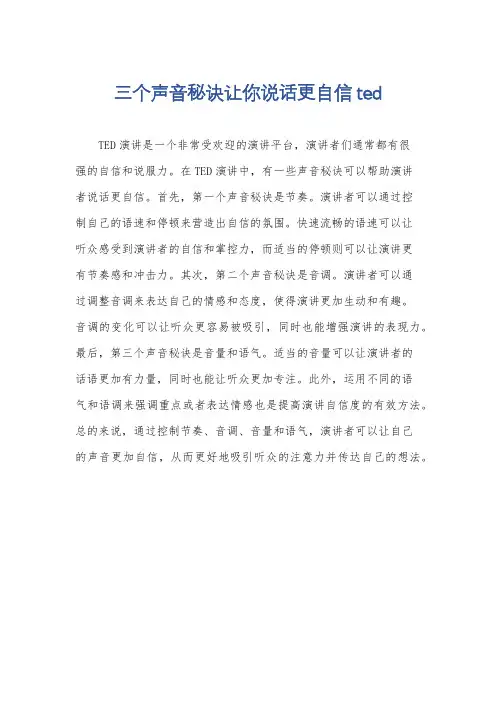
三个声音秘诀让你说话更自信ted
TED演讲是一个非常受欢迎的演讲平台,演讲者们通常都有很
强的自信和说服力。
在TED演讲中,有一些声音秘诀可以帮助演讲
者说话更自信。
首先,第一个声音秘诀是节奏。
演讲者可以通过控
制自己的语速和停顿来营造出自信的氛围。
快速流畅的语速可以让
听众感受到演讲者的自信和掌控力,而适当的停顿则可以让演讲更
有节奏感和冲击力。
其次,第二个声音秘诀是音调。
演讲者可以通
过调整音调来表达自己的情感和态度,使得演讲更加生动和有趣。
音调的变化可以让听众更容易被吸引,同时也能增强演讲的表现力。
最后,第三个声音秘诀是音量和语气。
适当的音量可以让演讲者的
话语更加有力量,同时也能让听众更加专注。
此外,运用不同的语
气和语调来强调重点或者表达情感也是提高演讲自信度的有效方法。
总的来说,通过控制节奏、音调、音量和语气,演讲者可以让自己
的声音更加自信,从而更好地吸引听众的注意力并传达自己的想法。
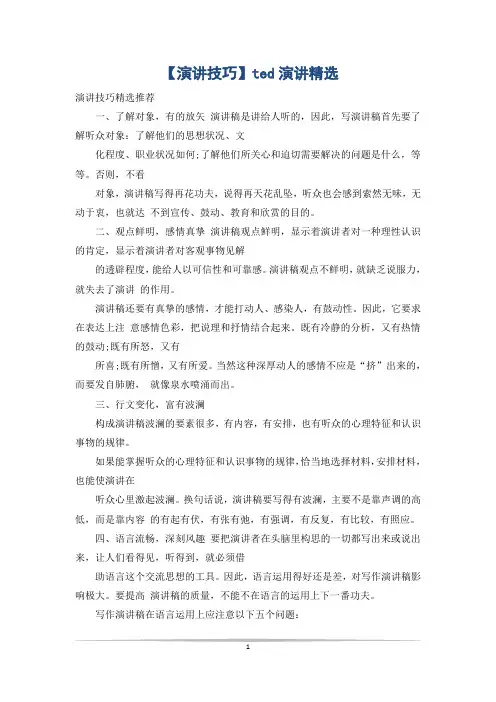
【演讲技巧】ted演讲精选演讲技巧精选推荐一、了解对象,有的放矢演讲稿是讲给人听的,因此,写演讲稿首先要了解听众对象:了解他们的思想状况、文化程度、职业状况如何;了解他们所关心和迫切需要解决的问题是什么,等等。
否则,不看对象,演讲稿写得再花功夫,说得再天花乱坠,听众也会感到索然无味,无动于衷,也就达不到宣传、鼓动、教育和欣赏的目的。
二、观点鲜明,感情真挚演讲稿观点鲜明,显示着演讲者对一种理性认识的肯定,显示着演讲者对客观事物见解的透辟程度,能给人以可信性和可靠感。
演讲稿观点不鲜明,就缺乏说服力,就失去了演讲的作用。
演讲稿还要有真挚的感情,才能打动人、感染人,有鼓动性。
因此,它要求在表达上注意感情色彩,把说理和抒情结合起来。
既有冷静的分析,又有热情的鼓动;既有所怒,又有所喜;既有所憎,又有所爱。
当然这种深厚动人的感情不应是“挤”出来的,而要发自肺腑,就像泉水喷涌而出。
三、行文变化,富有波澜构成演讲稿波澜的要素很多,有内容,有安排,也有听众的心理特征和认识事物的规律。
如果能掌握听众的心理特征和认识事物的规律,恰当地选择材料,安排材料,也能使演讲在听众心里激起波澜。
换句话说,演讲稿要写得有波澜,主要不是靠声调的高低,而是靠内容的有起有伏,有张有弛,有强调,有反复,有比较,有照应。
四、语言流畅,深刻风趣要把演讲者在头脑里构思的一切都写出来或说出来,让人们看得见,听得到,就必须借助语言这个交流思想的工具。
因此,语言运用得好还是差,对写作演讲稿影响极大。
要提高演讲稿的质量,不能不在语言的运用上下一番功夫。
写作演讲稿在语言运用上应注意以下五个问题:(一)要口语化。
“上口”、“入耳”这是对演讲语言的基本要求,也就是说演讲的语言要口语化。
演讲,说出来的是一连串声音,听众听到的也是一连串声音。
听众能否听懂,要看演讲者能否说得好,更要看演讲稿是否写得好。
如果演讲稿不“上口”,那么演讲的内容再好,也不能使听众“入耳”,完全听懂。
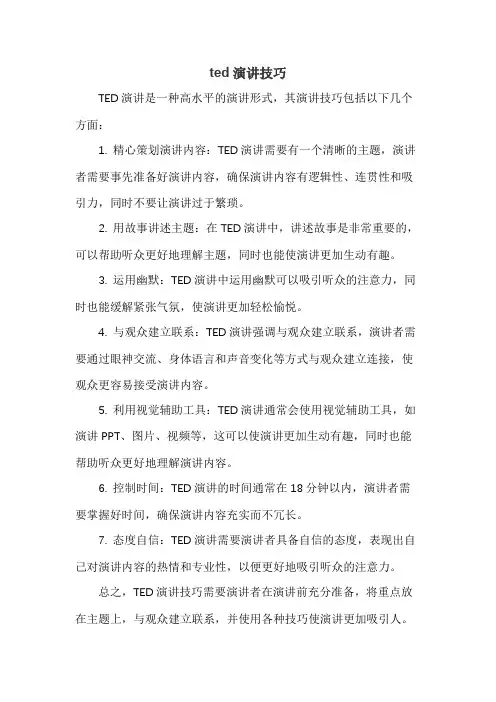
ted演讲技巧
TED演讲是一种高水平的演讲形式,其演讲技巧包括以下几个方面:
1. 精心策划演讲内容:TED演讲需要有一个清晰的主题,演讲者需要事先准备好演讲内容,确保演讲内容有逻辑性、连贯性和吸引力,同时不要让演讲过于繁琐。
2. 用故事讲述主题:在TED演讲中,讲述故事是非常重要的,可以帮助听众更好地理解主题,同时也能使演讲更加生动有趣。
3. 运用幽默:TED演讲中运用幽默可以吸引听众的注意力,同时也能缓解紧张气氛,使演讲更加轻松愉悦。
4. 与观众建立联系:TED演讲强调与观众建立联系,演讲者需要通过眼神交流、身体语言和声音变化等方式与观众建立连接,使观众更容易接受演讲内容。
5. 利用视觉辅助工具:TED演讲通常会使用视觉辅助工具,如演讲PPT、图片、视频等,这可以使演讲更加生动有趣,同时也能帮助听众更好地理解演讲内容。
6. 控制时间:TED演讲的时间通常在18分钟以内,演讲者需要掌握好时间,确保演讲内容充实而不冗长。
7. 态度自信:TED演讲需要演讲者具备自信的态度,表现出自己对演讲内容的热情和专业性,以便更好地吸引听众的注意力。
总之,TED演讲技巧需要演讲者在演讲前充分准备,将重点放在主题上,与观众建立联系,并使用各种技巧使演讲更加吸引人。
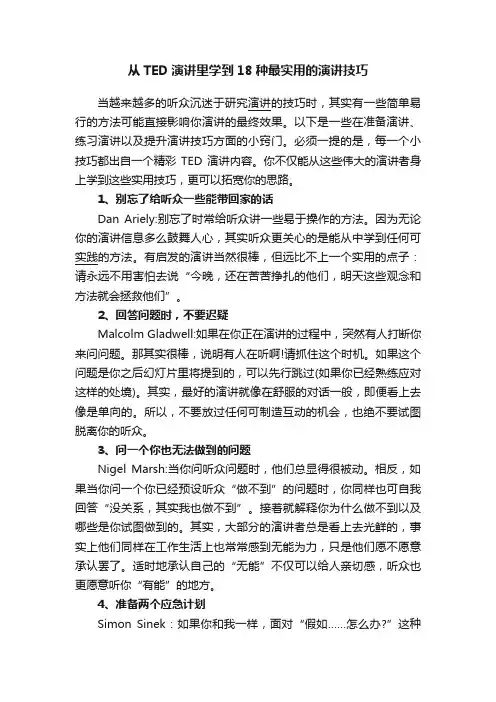
从TED演讲里学到18种最实用的演讲技巧当越来越多的听众沉迷于研究演讲的技巧时,其实有一些简单易行的方法可能直接影响你演讲的最终效果。
以下是一些在准备演讲、练习演讲以及提升演讲技巧方面的小窍门。
必须一提的是,每一个小技巧都出自一个精彩TED演讲内容。
你不仅能从这些伟大的演讲者身上学到这些实用技巧,更可以拓宽你的思路。
1、别忘了给听众一些能带回家的话Dan Ariely:别忘了时常给听众讲一些易于操作的方法。
因为无论你的演讲信息多么鼓舞人心,其实听众更关心的是能从中学到任何可实践的方法。
有启发的演讲当然很棒,但远比不上一个实用的点子:请永远不用害怕去说“今晚,还在苦苦挣扎的他们,明天这些观念和方法就会拯救他们”。
2、回答问题时,不要迟疑Malcolm Gladwell:如果在你正在演讲的过程中,突然有人打断你来问问题。
那其实很棒,说明有人在听啊!请抓住这个时机。
如果这个问题是你之后幻灯片里将提到的,可以先行跳过(如果你已经熟练应对这样的处境)。
其实,最好的演讲就像在舒服的对话一般,即便看上去像是单向的。
所以,不要放过任何可制造互动的机会,也绝不要试图脱离你的听众。
3、问一个你也无法做到的问题Nigel Marsh:当你问听众问题时,他们总显得很被动。
相反,如果当你问一个你已经预设听众“做不到”的问题时,你同样也可自我回答“没关系,其实我也做不到”。
接着就解释你为什么做不到以及哪些是你试图做到的。
其实,大部分的演讲者总是看上去光鲜的,事实上他们同样在工作生活上也常常感到无能为力,只是他们愿不愿意承认罢了。
适时地承认自己的“无能”不仅可以给人亲切感,听众也更愿意听你“有能”的地方。
4、准备两个应急计划Simon Sinek:如果你和我一样,面对“假如……怎么办?”这种问题会陷入极大的焦虑,比如面对“假如你的幻灯片放不出来怎么办”、“假如有听众不停地打断你的演讲怎么办”、“如果你的开场白毫无共鸣”等问题。
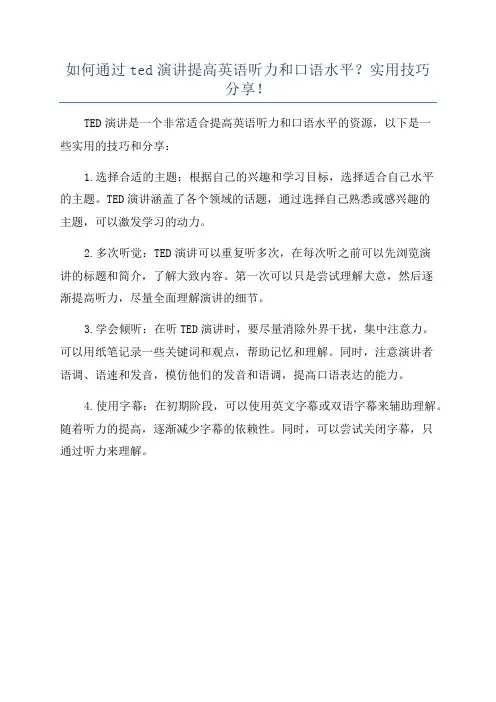
如何通过ted演讲提高英语听力和口语水平?实用技巧
分享!
TED演讲是一个非常适合提高英语听力和口语水平的资源,以下是一
些实用的技巧和分享:
1.选择合适的主题:根据自己的兴趣和学习目标,选择适合自己水平
的主题。
TED演讲涵盖了各个领域的话题,通过选择自己熟悉或感兴趣的
主题,可以激发学习的动力。
2.多次听觉:TED演讲可以重复听多次,在每次听之前可以先浏览演
讲的标题和简介,了解大致内容。
第一次可以只是尝试理解大意,然后逐
渐提高听力,尽量全面理解演讲的细节。
3.学会倾听:在听TED演讲时,要尽量消除外界干扰,集中注意力。
可以用纸笔记录一些关键词和观点,帮助记忆和理解。
同时,注意演讲者
语调、语速和发音,模仿他们的发音和语调,提高口语表达的能力。
4.使用字幕:在初期阶段,可以使用英文字幕或双语字幕来辅助理解。
随着听力的提高,逐渐减少字幕的依赖性。
同时,可以尝试关闭字幕,只
通过听力来理解。
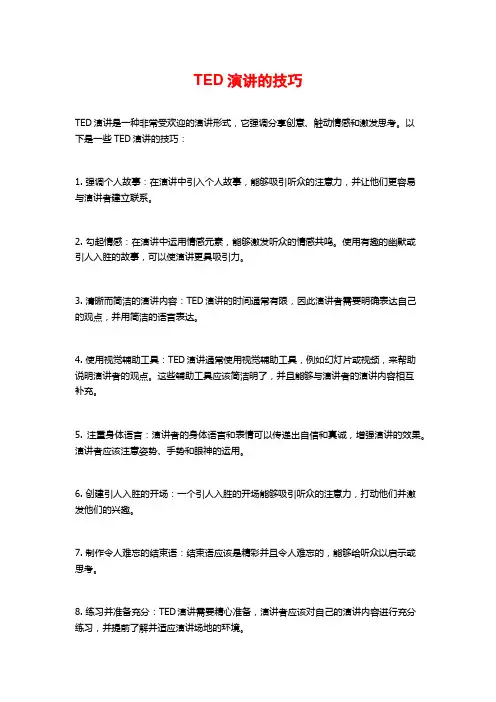
TED演讲的技巧TED演讲是一种非常受欢迎的演讲形式,它强调分享创意、触动情感和激发思考。
以下是一些TED演讲的技巧:1. 强调个人故事:在演讲中引入个人故事,能够吸引听众的注意力,并让他们更容易与演讲者建立联系。
2. 勾起情感:在演讲中运用情感元素,能够激发听众的情感共鸣。
使用有趣的幽默或引人入胜的故事,可以使演讲更具吸引力。
3. 清晰而简洁的演讲内容:TED演讲的时间通常有限,因此演讲者需要明确表达自己的观点,并用简洁的语言表达。
4. 使用视觉辅助工具:TED演讲通常使用视觉辅助工具,例如幻灯片或视频,来帮助说明演讲者的观点。
这些辅助工具应该简洁明了,并且能够与演讲者的演讲内容相互补充。
5. 注重身体语言:演讲者的身体语言和表情可以传递出自信和真诚,增强演讲的效果。
演讲者应该注意姿势、手势和眼神的运用。
6. 创建引人入胜的开场:一个引人入胜的开场能够吸引听众的注意力,打动他们并激发他们的兴趣。
7. 制作令人难忘的结束语:结束语应该是精彩并且令人难忘的,能够给听众以启示或思考。
8. 练习并准备充分:TED演讲需要精心准备,演讲者应该对自己的演讲内容进行充分练习,并提前了解并适应演讲场地的环境。
9. 与听众互动:TED演讲不仅仅是演讲者向听众传达信息,而是一种与听众的互动。
演讲者应该设法与听众建立联系,例如通过提问或开放性问题鼓励他们参与演讲。
10. 保持真实和热情:TED演讲强调演讲者的真实性和热情。
演讲者应该表达自己对话题的热情,并展示出真实的自我。
这样能够增加演讲的动力和吸引力。
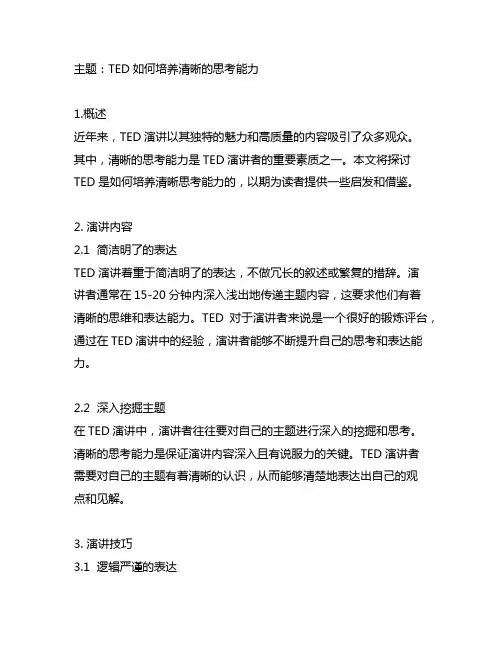
主题:TED如何培养清晰的思考能力1.概述近年来,TED演讲以其独特的魅力和高质量的内容吸引了众多观众。
其中,清晰的思考能力是TED演讲者的重要素质之一。
本文将探讨TED是如何培养清晰思考能力的,以期为读者提供一些启发和借鉴。
2. 演讲内容2.1 简洁明了的表达TED演讲着重于简洁明了的表达,不做冗长的叙述或繁复的措辞。
演讲者通常在15-20分钟内深入浅出地传递主题内容,这要求他们有着清晰的思维和表达能力。
TED对于演讲者来说是一个很好的锻炼评台,通过在TED演讲中的经验,演讲者能够不断提升自己的思考和表达能力。
2.2 深入挖掘主题在TED演讲中,演讲者往往要对自己的主题进行深入的挖掘和思考。
清晰的思考能力是保证演讲内容深入且有说服力的关键。
TED演讲者需要对自己的主题有着清晰的认识,从而能够清楚地表达出自己的观点和见解。
3. 演讲技巧3.1 逻辑严谨的表达TED演讲着重于逻辑严谨的表达,演讲者需要对自己的观点和论据有着清晰的思考和理解,以确保演讲内容的连贯性和说服力。
这要求演讲者有着较高的逻辑思维能力,能够清晰地理顺自己的观点和论证。
3.2 能够清晰陈述观点TED演讲者在演讲中需要能够清晰、准确地陈述自己的观点和见解。
这对于演讲者来说需要有着较强的思考和语言表达能力,通过不断地演练和修正,演讲者能够培养清晰的思考和表达能力。
4. 结语TED演讲作为一个高质量的演讲评台,为演讲者提供了很好的锻炼机会,帮助他们培养清晰的思考和表达能力。
通过深入挖掘主题、逻辑严谨的表达和清晰陈述观点等方式,TED演讲者不断提升着自己的思考能力,为观众呈现出更为精彩的演讲内容。
5. 参考文献[1] "TED演讲技巧",TED,xxx 演讲的影响5.1 启发观众思考TED演讲以其独特的主题和深刻的观点吸引着来自世界各地的观众。
演讲者在演讲中的清晰思考和表达能力能够深刻地启发观众的思考。
观众从中能够受益,学习到那些优秀思考者的经验,同时也能够通过观看和聆听TED演讲来提升自己的思考能力。
演讲技巧的重要性英语作文英文回答:The Importance of Public Speaking Skills.Public speaking skills are crucial in today's society. Whether you are a student, a professional, or a leader, the ability to effectively communicate your ideas and thoughts to an audience is essential. In this essay, I will discuss the importance of public speaking skills and provide examples to illustrate my points.To begin with, public speaking skills are important for students. In school, students often have to give presentations or participate in debates. These activities not only help them improve their communication skills but also boost their confidence. For instance, when I was in high school, I had to give a presentation on a research project. Although I was nervous at first, I practiced my speech multiple times and received feedback from myclassmates. As a result, I was able to deliver my presentation confidently and received a good grade.Furthermore, public speaking skills are crucial for professionals in the workplace. Whether you are presentinga proposal to your colleagues or speaking at a conference, the ability to articulate your ideas clearly and persuasively is essential. For example, in my previous job, I had to pitch a new marketing strategy to my team. Byusing persuasive language and providing compelling evidence, I was able to convince my colleagues of the effectivenessof the strategy. As a result, our team successfully implemented the new approach and achieved positive results.Moreover, public speaking skills are vital for leaders.A leader must be able to inspire and motivate their team members, and effective communication plays a significantrole in achieving this. For instance, when I was a team leader, I had to deliver a speech to my team to boost their morale during a challenging project. By using motivational language and sharing personal anecdotes, I was able touplift their spirits and encourage them to overcomeobstacles. As a result, our team successfully completed the project ahead of schedule.In conclusion, public speaking skills are essential in various aspects of life. Whether you are a student, a professional, or a leader, the ability to communicate effectively in front of an audience is crucial. By developing these skills, individuals can improve their confidence, persuade others, and inspire their peers. Therefore, it is important to invest time and effort in honing public speaking skills.中文回答:演讲技巧的重要性。
ted演讲的八个技巧TED演讲有八个技巧,这些技巧可以帮助演讲者更好地表达自己的想法和观点,增加演讲的吸引力和影响力。
1.故事化表达:TED演讲者通常会使用故事来吸引听众的注意力,让听众更容易理解和记住他们的观点。
因此,在演讲中使用故事是非常重要的技巧。
2.用幽默感:幽默感可以增加演讲的趣味性,帮助听众更好地理解和记住演讲的内容。
但是,使用幽默感需要适度,避免过于刻意或不适当。
3.运用有效的语言:TED演讲者通常使用简单、明了、易于理解的语言来表达自己的观点。
他们也会使用一些有效的词汇和短语来增加演讲的吸引力和影响力。
4.保持简洁:TED演讲的时间有限,通常只有18分钟。
因此,演讲者必须尽可能地精简自己的演讲内容,突出重点。
他们通常会使用简洁的句子和简短的段落来表达自己的观点。
5.调动情感:TED演讲者通常会使用情感化的语言和故事来调动听众的情感,让听众更容易被说服。
他们通常会使用积极、鼓舞人心的语言来增加听众的信心和热情。
6.利用视觉辅助工具:TED演讲者通常会利用视觉辅助工具来增加演讲的吸引力和影响力。
这些工具包括图表、图片、视频等。
这些工具可以帮助听众更好地理解和记住演讲的内容。
7.调动身体语言:TED演讲者通常会使用身体语言来增加演讲的吸引力和影响力。
他们通常会使用自然、生动的身体动作来吸引听众的注意力,同时也会利用面部表情和眼神来与听众交流。
8.利用声音变化:TED演讲者通常会利用声音的变化来增加演讲的吸引力和影响力。
他们通常会使用不同的语调和语速来表达不同的情感和观点,同时也会利用声音的变化来引导听众的注意力。
总之,以上是TED演讲的一些技巧,这些技巧可以帮助演讲者更好地表达自己的想法和观点,增加演讲的吸引力和影响力。
英语演讲稿TED英语演讲:如何在说话时表现出你的专业性TED英语演讲:如何在说话时表现出你的专业性放声说话并不是一件容易的事情,哥伦比亚大学商学院教授Adam Galinsky通过心理研究想出了许多解决这一问题的办法。
下面是小编为大家收集关于TED英语演讲:如何在说话时表现出你的专业性,欢迎借鉴参考。
演说题目:如何在说话时表现出你的专业性?演说者:Adam Galinsky演讲稿Speaking up is hard to do. I understood the true meaning of this phrase exactly one month ago, when my wife and I became new parents. It was an amazing moment. It was exhilarating and elating, but it was also scary and terrifying. And it got particularly terrifying when we got home from the hospital,and we were unsure whether our little baby boy was getting enough nutrients from breastfeeding. And we wanted to call our pediatrician, but we also didn't want to make a bad first impression or come across as a crazy, neurotic parent. So we worried. And we waited. When we got to the doctor's office the next day, she immediately gave him formula because he was pretty dehydrated. Our son is fine now, and our doctor has reassured us we can always contact her. But in that moment, I should've spoken up, but I didn't.But sometimes we speak up when we shouldn't, and I learned thatover 10 years ago when I let my twin brother down. My twin brother is a documentary filmmaker, and for one of his first films, he got an offer from a distribution company. He was excited, and he was inclined to accept the offer. But as a negotiationsresearcher, I insisted he make a counteroffer, and I helped him craft the perfect one.And it was perfect -- it was perfectly insulting. The company was so offended, they literally withdrew the offer and my brother was left with nothing.And I've asked people all over the world about this dilemma of speaking up: when they can assert themselves, when they can push their interests, when they can express an opinion, when they can make an ambitious ask.And the range of stories are varied and diverse, but they also make up a universal tapestry. Can I correct my boss when they make a mistake? Can I confront my coworker who keeps stepping on my toes? Can I challenge my friend's insensitive joke? Can I tell the person I love the most my deepest insecurities?And through these experiences, I've come to recognize that each of us have something called a range of acceptable behavior. Now, sometimes we're too strong; we push ourselves too much. That's what happened with my brother. Even making an offer was outside his range of acceptable behavior.But sometimes we're too weak. That's what happened with my wife and I. And this range of acceptable behaviors --when we stay within our range, we're rewarded. When we step outside that range, we get punished in a variety of ways. We get dismissed or demeaned or even ostracized. Or we lose that raise or that promotion or that deal.Now, the first thing we need to know is: What is my range? But the key thing is, our range isn't fixed;it's actually pretty dynamic. It expands and it narrows based on the context. And there's one thing that determines that range more than anything else, and that's your power. Your power determines your range. What is power? Power comes in lots of forms. In negotiations, itcomes in the form of alternatives. So my brother had no alternatives; he lacked power. The company had lots of alternatives; they had power. Sometimes it's being new to a country, like an immigrant, or new to an organization or new to an experience, like my wife and I as new parents. Sometimes it's at work,where someone's the boss and someone's the subordinate. Sometimes it's in relationships, where one person's more invested than the other person.And the key thing is that when we have lots of power, our range is very wide. We have a lot of leeway in how to behave. But when we lack power, our range narrows. We have very little leeway. The problem is that when our range narrows, that produces something called the low-power double bind.The low-power double bind happens when, if we don't speak up, we go unnoticed, but if we do speak up, we getpunished.Now, many of you have heard the phrase the "double bind" and connected it with one thing, and that's gender. The gender double bind is women who don't speak up go unnoticed, and women who do speak up get punished. And the key thing is that women have the same need as men to speak up,but they have barriers to doing so. But what my research has shown over the last two decades is that what looks like a gender difference is not really a gender double bind, it's a really a low-power double bind. And what looks like a gender difference are really often just power differences in disguise.Oftentimes we see a difference between a man and a woman or men and women, and think, "Biological cause. There's something fundamentally different about the sexes." But in study after study, I've found that a better explanation for many sex differences is really power. And so it'sthe low-power double bind. And the low-power double bind means that we have a narrow range, and we lack power. We have a narrow range, and our double bind is very large.So we need to find ways to expand our range. And over the last couple decades, my colleagues and I have found two things really matter. The first: you seem powerful in your own eyes. The second: you seem powerful in the eyes of others. When I feel powerful, I feel confident, not fearful; I expand my own range. When other people see me as powerful,they grant me a wider range. So we need tools to expand our range of acceptable behavior. And I'm going to give you a set of tools today. Speaking up is risky, but these tools will lower your risk of speaking up.The first tool I'm going to give you got discovered in negotiations in an important finding. On average, women make less ambitious offers and get worse outcomes than men at the bargaining table. But Hannah Riley Bowles and Emily Amanatullah have discovered there's one situation where women get the same outcomes as men and are just as ambitious. That's when they advocate for others.When they advocate for others, they discover their own range and expand it in their own mind. They become more assertive. This is sometimes called "the mama bear effect." Like a mama bear defending her cubs, when we advocate for others, we can discover our own voice.But sometimes, we have to advocate for ourselves. How do we do that? One of the most important tools we have to advocate for ourselves is something called perspective-taking. And perspective-taking is really simple: it's simply looking at the world through the eyes of another person. It's one of the most important tools we have to expand our range. When I take yourperspective, and I think about what you really want, you're more likely to give me what I really want.But here's the problem: perspective-taking is hard to do. So let's do a little experiment. I want you all to hold your hand just like this: yourfinger -- put it up. And I want you to draw a capital letter E on your forehead as quickly as possible. OK, it turns out that we can draw this E in one of two ways, and this was originally designed as a test of perspective-taking. I'm going to show you two pictures of someone with an E on their forehead -- my former student, Erika Hall. And you can see over here,that's the correct E. I drew the E so it looks like an E to another person. That's the perspective-taking E because it looks like an E from someone else's vantage point. But this E over here is the self-focused E. We often get self-focused. And we particularly get self-focused in a crisis.I want to tell you about a particular crisis. A man walks intoa bank in Watsonville, California. And he says, "Give me $2,000, or I'm blowing the whole bank up with a bomb." Now, the bank manager didn't give him the money. She took a step back. She took his perspective, and she noticed something really important. He asked for a specific amount of money.So she said, "Why did you ask for $2,000?"And he said, "My friend is going to be evicted unless I get him $2,000 immediately."And she said, "Oh! You don't want to rob the bank -- you want to take out a loan.""Why don't you come back to my office, and we can have you fill out the paperwork."Now, her quick perspective-taking defused a volatilesituation. So when we take someone's perspective, it allows us to be ambitious and assertive, but still be likable.Here's another way to be assertive but still be likable, and that is to signal flexibility. Now, imagine you're a car salesperson, and you want to sell someone a car. You're going to more likely make the sale if you give them two options. Let's say option A: $24,000 for this car and a five-year warranty. Or option B: $23,000 and a three-year warranty. My research shows that when you give people a choice among options, it lowers their defenses, and they're more likely to accept your offer.And this doesn't just work with salespeople; it works with parents. When my niece was four, she resisted getting dressed and rejected everything. But then my sister-in-law had a brilliant idea. What if I gave my daughter a choice? This shirt or that shirt? OK, that shirt. This pant or that pant? OK, that pant. And it worked brilliantly. She got dressed quickly and without resistance.When I've asked the question around the world when people feel comfortable speaking up, the number one answer is: "When I have social support in my audience; when I have allies." So we want to get allies on our side. How do we do that? Well, one of the ways is be a mama bear. When we advocate for others, we expand our range in our own eyes and the eyes of others, but we also earn strong allies.Another way we can earn strong allies, especially in high places, is by asking other people for advice.When we ask others for advice, they like us because we flatter them, and we're expressing humility.And this really works to solve another double bind. And that's the self-promotion double bind. The self-promotion double bind is that if we don't advertise our accomplishments, no one notices. And if we do, we're not likable.But if we ask for advice about one of our accomplishments, we are able to be competent in their eyes but also be likeable. And this is so powerful it even works when you see it coming. There have been multiple times in life when I have been forewarned that a low-power person has been given the advice to come ask me for advice. I want you to notice three things about this: First, I knew they were going to come ask me for advice. Two, I've actually done research on the strategic benefits of asking for advice. And three, it still worked! I took their perspective, I became more invested in their cause, I became more committed to them because they asked for advice.Now, another time we feel more confident speaking up is when we have expertise. Expertise gives us credibility. When we have high power, we already have credibility. We only need good evidence.When we lack power, we don't have the credibility. We need excellent evidence.And one of the ways we can come across as an expert is by tapping into our passion. I want everyone in the next few days to go up to friendof theirs and just say to them, "I want you to describe a passion of yours to me." I've had people do this all over the world and I asked them, "What did you notice about the other person when they described their passion?" And the answers are always the same."Their eyes lit up and got big." "They smiled a big beaming smile." "They used their hands all over -- I had to duck because their hands were coming at me." "They talk quickly with a little higher pitch.""They leaned in as if telling me a secret."And then I said to them, "What happened to you as you listened to their passion?"They said, "My eyes lit up. I smiled. I leaned in."When we tap into our passion, we give ourselves the courage, in our own eyes, to speak up, but we also get the permission from others to speak up. Tapping into our passion even works when we come across as too weak. Both men and women get punished at work when they shed tears. But Lizzie Wolf has shown that when we frame our strong emotions as passion, the condemnation of our crying disappears for both men and women.I want to end with a few words from my late father that he spoke at my twin brother's wedding. Here's a picture of us. My dad was a psychologist like me, but his real love and his real passion was cinema,like my brother. And so he wrote a speech for my brother'swedding about the roles we play in the human comedy.And he said, "The lighter your touch, the better you become at improving and enriching your performance. Those who embrace their roles and work to improve their performance grow, change and expand the self. Play it well, and your days will be mostly joyful."What my dad was saying is that we've all been assigned ranges and roles in this world. But he was also saying the essence of this talk: those roles and ranges are constantly expanding and evolving.So when a scene calls for it, be a ferocious mama bear and a humble advice seeker. Have excellent evidence and strong allies. Be a passionate perspective taker. And if you use those tools -- and each and every one of you can use these tools -- you will expand your range of acceptable behavior, and your days will be mostly joyful.Thank you.放大声音得说话并不简单。
让内向变成自信,让演讲成为你的另一个自我——TED英语演讲稿Let Your Shyness Turn into Confidence: Let TED English Speech Be Your Alter EgoAs an introverted individual, it can be challenging to express yourself in public, especially in a group setting. It is a common misconception that being introverted is synonymous with being shy. However, that’s not always the case. Introverts are often quiet, reserved, and more comfortable in solitary activities, while shy individuals are prone to avoiding social situations or reluctant to initiate conversations. Regardless of whether you’re introverted or shy, public speaking can become an intimidating task.However, there are ways to overcome these feelings ofself-doubt and turn shyness into self-confidence. One such tool is TED talks. TED (Technology, Entertainment, Design) is a non-profit organization that organizes conferencesfeaturing speakers who give presentations about varioustopics like science, business, technology, and culture. TED has been instrumental in helping people develop their communication skills, and it can be a particularly usefulresource for introverted or shy individuals looking to become more confident communicators.Here are a few reasons why TED talks can be beneficial:1. They Provide Opportunities to Learn from Great SpeakersTED talks feature some of the best communicators in the world. Listening to their talks can help an individual learn new communication techniques and become familiar withspeaking patterns and styles. One can learn techniques suchas voice modulation, body language, and eye contact, whichcan help improve the overall quality of their public speaking.2. TED Talks Can Boost Your ConfidenceWatching inspiring talks and seeing how speakers convey their message with confidence and authority can be empowering. When you watch a TED talk, you might feel like you’re in the audience, but in reality, you are learning from the speaker's charisma and confidence. This can help you gain confidence in your communication skills and inspire you to work on your own style of public speaking.3. TED Talks Help You Find Your VoiceAn essential aspect of public speaking is finding one's voice – the ability to speak with authenticity and passionon topics. TED talks can help individuals identify topicsthat excite them and help them craft a story that they feel passionate about. They can also help individuals build their brand and establish a reputation through public speaking opportunities.4. TED Talks Can Help Build NetworksParticipating in TED talks and attending conferences can help individuals build their networks. These opportunitiesoffer chances to meet like-minded individuals, develop friendships, and learn from others' experiences. The atmosphere at TED conferences is supportive and collaborative, which makes it easier to connect with individuals fromdifferent backgrounds and professional settings.5. TED Talks Offer Global ExposureTED conferences are incredibly diverse, with participants and speakers from all over the world. Participating in a TED talk or attending a conference can provide exposure to different cultures, ideas, and perspectives. This exposure can help individuals develop a global perspective and build empathy towards individuals from different backgrounds.ConclusionIn conclusion, public speaking is a crucial skill that individuals need to develop, regardless of their professionor the field they work in. TED talks provide an essential platform for individuals to grow, learn and ultimately, craft their story. They are an excellent resource for introverted and shy individuals looking to build their confidence and improve their communication skills. While it may take time and practice to become a great communicator, TED talks offer an excellent opportunity to learn from the best and hone your skills in a supportive environment. So, don't let your shyness hold you back. Take the first step towards becoming a better communicator today!。
TED英语演讲:情商高的人怎样说话说话是人类最常运用的沟通方式,我们每天要说不少话,也得接收很多话,有些话被听进去了,但有些话却被当成耳边风。
你是否曾怀疑:「为什么别人都不听我说话?」许多人总以为,话说了却没达到沟通的效果,八成是听话的人没专心,但其实问题也可能出在说话的人身上。
你知道到底要怎么说,别人才会听?下面是小编为大家收集关于TED英语演讲之情商高的人怎样说话,欢迎借鉴参考。
| 中英文演讲稿 |We are losing our listening. We spend roughly 60 percent of our communication time listening, But we're not very good at it. We retain just 25 percent of what we hear. Now not you, not this talk, but that is generally true. Let's define listening as making meaning from sound. It's a mental process, and it's a process of extraction.我们正在丧失倾听的能力。
我们交流过程中60%的时间都是用来倾听,但其实我们并不擅长倾听。
我们只保留了25%所听到的内容,不是指在座各位和这个演讲,这是一个普遍的事实。
让我们来定义倾听,就是使得声音有意义,这是一个心理过程,它也是一个提取的过程。
The human voice: It's the instrument we all play. It's the most powerful sound in the world, probably. It's the only one that can start a war or say "I love you." And yet many people have the experience that when they speak, people don't listen to them. And why is that? How can we speak powerfully to make change in the world?人类的声音:是我们所有人都弹奏的乐器,可能是这个世界上最有力的声音,它绝无仅有,或能引起战争,或能说“我爱你”。
TED英语演讲:想成为演讲达人必须知道的5个技巧掌握演讲技巧是人的必备素养之一,人生在世,无论是求学还是求职,难免有时候要演讲,这时候如果你能够露一手,技惊四座,很可能马上让别人刮目相看。
今天和大家分享TED的演讲教练Amy Wolff 分享的5个超实用演讲技巧,让你离演讲达人之路更进一步。
想成为演讲达人必须知道的5个技巧我有5个在公众场合演讲的技巧,不管是在小教室里,在会议室里,或者只是想在一个开心的时刻建立良好的人际关系,怎样才能给人留下好印象呢?I have five speaking tips for you whenever youre in public,whether thats in a small classroom,at a boardroom table,or maybe youre just a happy hour wanting to network well. How on earth can you make a good impression?好的,事实上都是一些很基本的东西,以下是我给你的5个实用建议。
Well, there are some really fundamental basic things.So here are my five practical tips for you.首先,你必须了解你演讲的内容,照本宣科通常很不好,所以当朋友打电话或发短信给我说,我有一个很重要的演讲,我太紧张了,该怎么办呢?我会说,你对你演讲的内容了解吗?因为如果你只是照着幻灯片朗读,很可能会让别人以为你连你自己要讲的东西都不清楚。
The first is, you have to know your content.Read it rarely looks good.So when friends call or te_t me say :I have a big presentation, Im so nervous, what do we do.I say, how well do you know yourcontent?Because if youre making it up on the slide,its probably going to translate like,you dont know your stuff.我的第二个建议是,要真实。
TED英语演讲:如何在说话时表现出你的专业性放声说话并不是一件容易的事情,哥伦比亚大学商学院教授Adam Galinsky通过心理研究想出了许多解决这一问题的办法。
下面是小编为大家收集关于TED英语演讲:如何在说话时表现出你的专业性,欢迎借鉴参考。
演说题目:如何在说话时表现出你的专业性?演说者:Adam Galinsky演讲稿Speaking up is hard to do. I understood the true meaning of this phrase exactly one month ago, when my wife and I became new parents. It was an amazing moment. It was exhilarating and elating, but it was also scary and terrifying. And it got particularly terrifying when we got home from the hospital,and we were unsure whether our little baby boy was getting enough nutrients from breastfeeding. And we wanted to call our pediatrician, but we also didn't want to make a bad first impression or come across as a crazy, neurotic parent. So we worried. And we waited. When we got to the doctor's office the next day, she immediately gave him formula because he was pretty dehydrated. Our son is fine now, and our doctor has reassured us we can always contact her. But in that moment, I should'vespoken up, but I didn't.But sometimes we speak up when we shouldn't, and I learned that over 10 years ago when I let my twin brother down. My twin brother is a documentary filmmaker, and for one of his first films, he got an offer from a distribution company. He was excited, and he was inclined to accept the offer. But as a negotiations researcher, I insisted he make a counteroffer, and I helped him craft the perfect one.And it was perfect -- it was perfectly insulting. The company was so offended, they literally withdrew the offer and my brother was left with nothing.And I've asked people all over the world about this dilemma of speaking up: when they can assert themselves, when they can push their interests, when they can express an opinion, when they can make an ambitious ask.And the range of stories are varied and diverse, but they also make up a universal tapestry. Can I correct my boss when they make a mistake? Can I confront my coworker who keeps stepping on my toes? Can I challenge my friend's insensitive joke? Can I tell the person I love the most my deepest insecurities?And through these experiences, I've come to recognize thateach of us have something called a range of acceptable behavior. Now, sometimes we're too strong; we push ourselves too much. That's what happened with my brother. Even making an offer was outside his range of acceptable behavior.But sometimes we're too weak. That's what happened with my wife and I. And this range of acceptable behaviors -- when we stay within our range, we're rewarded. When we step outside that range, we get punished in a variety of ways. We get dismissed or demeaned or even ostracized. Or we lose that raise or that promotion or that deal.Now, the first thing we need to know is: What is my range? But the key thing is, our range isn't fixed;it's actually pretty dynamic. It expands and it narrows based on the context. And there's one thing that determines that range more than anything else, and that's your power. Your power determines your range. What is power? Power comes in lots of forms. In negotiations, it comes in the form of alternatives. So my brother had no alternatives; he lacked power. The company had lots of alternatives; they had power. Sometimes it's being new to a country, like an immigrant, or new to an organization or new to an experience, like my wife and I as new parents. Sometimes it's at work,where someone's the boss and someone's the subordinate. Sometimes it's in relationships, where oneperson's more invested than the other person.And the key thing is that when we have lots of power, our range is very wide. We have a lot of leeway in how to behave. But when we lack power, our range narrows. We have very little leeway. The problem is that when our range narrows, that produces something called the low-power double bind.Thelow-power double bind happens when, if we don't speak up, we go unnoticed, but if we do speak up, we get punished.Now, many of you have heard the phrase the "double bind" and connected it with one thing, and that's gender. The gender double bind is women who don't speak up go unnoticed, and women who do speak up get punished. And the key thing is that women have the same need as men to speak up,but they have barriers to doing so. But what my research has shown over the last two decades is that what looks like a gender difference is not really a gender double bind, it's a really a low-power double bind. And what looks like a gender difference are really often just power differences in disguise.Oftentimes we see a difference between a man and a woman or men and women, and think, "Biological cause. There's something fundamentally different about the sexes." But in study after study, I've found that a better explanation for many sex differences is really power.And so it's the low-power double bind. And the low-power double bind means that we have a narrow range, and we lack power. We have a narrow range, and our double bind is very large.So we need to find ways to expand our range. And over the last couple decades, my colleagues and I have found two things really matter. The first: you seem powerful in your own eyes. The second: you seem powerful in the eyes of others. When I feel powerful, I feel confident, not fearful; I expand my own range. When other people see me as powerful, they grant me a wider range. So we need tools to expand our range of acceptable behavior. And I'm going to give you a set of tools today. Speaking up is risky, but these tools will lower your risk of speaking up.The first tool I'm going to give you got discovered in negotiations in an important finding. On average, women make less ambitious offers and get worse outcomes than men at the bargaining table. But Hannah Riley Bowles and Emily Amanatullah have discovered there's one situation where women get the same outcomes as men and are just as ambitious. That's when they advocate for others.When they advocate for others, they discover their own range and expand it in their own mind. They become more assertive. This is sometimes called "the mama bear effect." Like a mama bear defending her cubs, when we advocatefor others, we can discover our own voice.But sometimes, we have to advocate for ourselves. How do we do that? One of the most important tools we have to advocate for ourselves is something called perspective-taking. And perspective-taking is really simple: it's simply looking at the world through the eyes of another person. It's one of the most important tools we have to expand our range. When I take your perspective, and I think about what you really want, you're more likely to give me what I really want.But here's the problem: perspective-taking is hard to do. So let's do a little experiment. I want you all to hold your hand just like this: your finger -- put it up. And I want you to draw a capital letter E on your forehead as quickly as possible. OK, it turns out that we can draw this E in one of two ways, and this was originally designed as a test of perspective-taking. I'm going to show you two pictures of someone with an E on their forehead -- my former student, Erika Hall. And you can see over here,that's the correct E. I drew the E so it looks like an E to another person. That's the perspective-taking E because it looks like an E from someone else's vantage point. But this E over here is the self-focused E. We often get self-focused. And we particularly getself-focused in a crisis.I want to tell you about a particular crisis. A man walks into a bank in Watsonville, California. And he says, "Give me $2,000, or I'm blowing the whole bank up with a bomb." Now, the bank manager didn't give him the money. She took a step back. She took his perspective, and she noticed something really important. He asked for a specific amount of money.So she said, "Why did you ask for $2,000?"And he said, "My friend is going to be evicted unless I get him $2,000 immediately."And she said, "Oh! You don't want to rob the bank -- you want to take out a loan.""Why don't you come back to my office, and we can have you fill out the paperwork."Now, her quick perspective-taking defused a volatile situation. So when we take someone's perspective, it allows us to be ambitious and assertive, but still be likable.Here's another way to be assertive but still be likable, and that is to signal flexibility. Now, imagine you're a car salesperson, and you want to sell someone a car. You're going to more likely make the sale if you give them two options. Let's say option A: $24,000 for this car and a five-year warranty.Or option B: $23,000 and a three-year warranty. My research shows that when you give people a choice among options, it lowers their defenses, and they're more likely to accept your offer.And this doesn't just work with salespeople; it works with parents. When my niece was four, she resisted getting dressed and rejected everything. But then my sister-in-law had a brilliant idea. What if I gave my daughter a choice? This shirt or that shirt? OK, that shirt. This pant or that pant? OK, that pant. And it worked brilliantly. She got dressed quickly and without resistance.When I've asked the question around the world when people feel comfortable speaking up, the number one answer is: "When I have social support in my audience; when I have allies." So we want to get allies on our side. How do we do that? Well, one of the ways is be a mama bear. When we advocate for others, we expand our range in our own eyes and the eyes of others, but we also earn strong allies.Another way we can earn strong allies, especially in high places, is by asking other people for advice.When we ask others for advice, they like us because we flatter them, and we're expressing humility.And this really works to solve anotherdouble bind. And that's the self-promotion double bind. The self-promotion double bind is that if we don't advertise our accomplishments, no one notices. And if we do, we're not likable.But if we ask for advice about one of our accomplishments, we are able to be competent in their eyes but also be likeable. And this is so powerful it even works when you see it coming. There have been multiple times in life when I have been forewarned that a low-power person has been given the advice to come ask me for advice. I want you to notice three things about this: First, I knew they were going to come ask me for advice. Two, I've actually done research on the strategic benefits of asking for advice. And three, it still worked! I took their perspective, I became more invested in their cause, I became more committed to them because they asked for advice.Now, another time we feel more confident speaking up is when we have expertise. Expertise gives us credibility. When we have high power, we already have credibility. We only need good evidence.When we lack power, we don't have the credibility. We need excellent evidence.And one of the ways we can come across as an expert is by tapping into our passion. I want everyone in the next few days to go up to friend of theirs and just say to them, "I want youto describe a passion of yours to me." I've had people do this all over the world and I asked them, "What did you notice about the other person when they described their passion?" And the answers are always the same."Their eyes lit up and got big." "They smiled a big beaming smile." "They used their hands all over -- I had to duck because their hands were coming at me." "They talk quickly with a little higher pitch.""They leaned in as if telling me a secret."And then I said to them, "What happened to you as you listened to their passion?"They said, "My eyes lit up. I smiled. I leaned in."When we tap into our passion, we give ourselves the courage, in our own eyes, to speak up, but we also get the permission from others to speak up. Tapping into our passion even works when we come across as too weak. Both men and women get punished at work when they shed tears. But Lizzie Wolf has shown that when we frame our strong emotions as passion, the condemnation of our crying disappears for both men and women.I want to end with a few words from my late father that he spoke at my twin brother's wedding. Here's a picture of us. My dad was a psychologist like me, but his real love and his real passion was cinema,like my brother. And so he wrote a speechfor my brother's wedding about the roles we play in the human comedy.And he said, "The lighter your touch, the better you become at improving and enriching your performance. Those who embrace their roles and work to improve their performance grow, change and expand the self. Play it well, and your days will be mostly joyful."What my dad was saying is that we've all been assigned ranges and roles in this world. But he was also saying the essence of this talk: those roles and ranges are constantly expanding and evolving.So when a scene calls for it, be a ferocious mama bear and a humble advice seeker. Have excellent evidence and strong allies. Be a passionate perspective taker. And if you use those tools -- and each and every one of you can use these tools -- you will expand your range of acceptable behavior, and your days will be mostly joyful.Thank you.放大声音得说话并不简单。